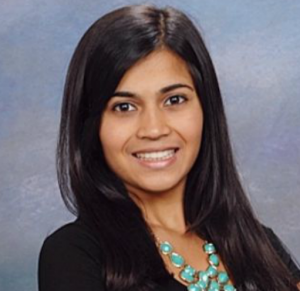by Monica Shah
Patient safety has always been a priority for me, but it is only recently that I became aware of the many issues that threaten quality of care for patients. As a medical student, I vividly remember shadowing at the hospital and being shocked at what I saw. I walked through patient rooms and heard loud beeps going off, the constant chatter of hospital staff, and the automatic entrance into patients’ rooms without even a knock. I wondered whether all of the disruptions and commotion impacted patient recovery in the hospital and after discharge. After pondering this, I decided that I wanted to take action and see what I, as a medical student, could do to improve daily inpatient conditions.
In order to begin addressing my vision, I knew I needed to find the right mentor in the right location. As a medical student, I feel like my life is on pause at times. During the school year when exams come in constant waves and my days are gone with my head in notes and books, I am pausing my time with friends and family, using my energy to pursue my dream of helping others improve their health. While I am blessed to have such an opportunity, I knew that during my time off between my first and second year of medical school, I wanted to be in Chicago, near my close friends. And from there it seemed as if everything fell into place perfectly. I found on the University of Chicago Medical School website that Dr. Vineet Arora is a prominent Society of Hospital Medicine member and was looking for medical students to conduct research on sleep/functional recovery during hospital stay and post-discharge. The minute I spoke to Dr. Arora, I knew that she would be a great mentor. Not only are her credentials and accomplishments unbelievable, but I could tell she is really passionate about the work she is doing. Her excitement for the project is contagious, and I started getting really excited to start!
After confirming my project, I decided to apply for the Student Hospitalist Scholar Grant. From the first draft I created to the final paper I submitted, I made many edits and learned some important things. First, I needed to narrow down my options and focus on a specific topic to investigate. I started off with a broader vision? I wanted to look at overall recovery in older hospitalized patients. But then I realized the amount of sub-questions that stem from that topic. What part of recovery am I investigating? What am I using for accurate measurement? Am I looking at recovery before, during, or after hospital stay? Finally, I narrowed my topic down to investigating objective and subjective measures of sleep in older hospitalized patients during hospital stay and one week post discharge.
When I was awarded the scholarship, I realized that standardizing patients and deciding which patients qualify for the study were difficult tasks. I saw that it was tough to equalize patients, for each patient had a variety of different symptoms. For our study, we decided that patients qualify if they are general medicine patients, free of any sleep disorder or delirium, and are ambulatory. Last but not least, the third thing I realized after receiving the scholarship was that there are administrative obstacles that need to be addressed before the real research can begin. From filling out paperwork to health screens to getting on the IRB, etc., the process to start research has been slow and requires patience.
Additionally, for me, success from this project comes in many layers. There is the first requirement of having a large enough sample size to run accurate tests and have substantial results in the end. While I hope to consent as many patients as I can, I have each patient’s best interest at heart and want to make sure they are comfortable participating in the study. The second factor of success is obtaining enough evidence so change can be made to improve hospital conditions-to improve patient outcomes. While this is my ultimate hope, I know it isn’t something in my control. The best I can do is stay unbiased and try to collect as accurate data as I can. The third and most important factor of success comes from making hospitalized patients happy that their voice, frustrations, and concerns are being heard. If I can ease any of the pain of the patients and be there for them to talk through their difficult journey, well now that’s success in my eyes.
 Monica Shah is a second year medical student at Wayne State University School of Medicine in Detroit, Michigan. She received her B.S. from the University of Michigan in 2014, with a major in Neuroscience. She has been very active in the research community for the past 5 years, assisting in projects in the fields of child behavioral pediatrics, gastroenterology, and psychiatry. Currently, she is one of the three medical students who received the SHM Student Hospitalist Student Scholar Grant with which she is conducting research related to quality of care for patients.
Monica Shah is a second year medical student at Wayne State University School of Medicine in Detroit, Michigan. She received her B.S. from the University of Michigan in 2014, with a major in Neuroscience. She has been very active in the research community for the past 5 years, assisting in projects in the fields of child behavioral pediatrics, gastroenterology, and psychiatry. Currently, she is one of the three medical students who received the SHM Student Hospitalist Student Scholar Grant with which she is conducting research related to quality of care for patients.



[…] posted July 14, […]